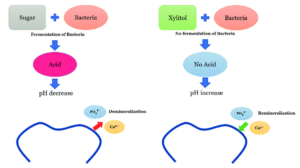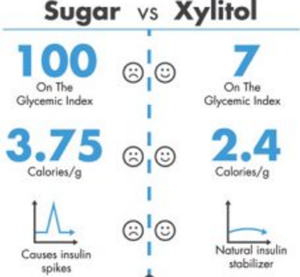Xylitol & Heart Attacks: Should You Worry?
The Dirt
A new study revealed a significant link between the sugar substitute xylitol and increased risk of stroke and heart attack. Should we worry about our use of products with xylitol, like gum, toothpaste, and added sweeteners? Let's look deeper into the research and find some key takeaways for our health.
Nutrition
Xylitol & Heart Attacks: Should You Worry?
The Dirt
A new study revealed a significant link between the sugar substitute xylitol and increased risk of stroke and heart attack. Should we worry about our use of products with xylitol, like gum, toothpaste, and added sweeteners? Let's look deeper into the research and find some key takeaways for our health.
A recent study led by Cleveland Clinic analyzed over 4,000 individuals across multiple clinical sites. Data was collected over several years. The study ultimately found there was an association between blood levels of xylitol and an increased risk of heart attack and stroke.
However, the study did not address food intake by participant, so it cannot be determined if the xylitol levels were based on dietary exposure or endogenously-produced xylitol. Ultimately, the study was not comprehensive at evaluating the long-term effects of xylitol when consumed in moderate amounts.
Since the publishing of the study, many consumers have mistakenly lumped all sugar-free sweeteners together, deducing that all sweeteners should avoided for fear of heart attack or stroke.
This is a concern as consumers are searching for a sweetener that meets their needs. According to Mintel, “There is an opportunity to help consumers feel informed and in control when making their sugar and sweetener choices.” Hearing about the downside of an unproven study does not help.
So let’s focus on what we do know about xylitol…
What is xylitol?
Xylitol is a sugar alcohol used as a sweetener in various food and dental care products. It is popular because it has fewer calories than sugar and is known for not causing tooth decay. It is also found in fruit, vegetables, and berries.
Xylitol differs from other sugar alcohols in several key ways, making it unique and beneficial for specific uses. Unlike many sugar alcohols, xylitol has a sweetness comparable to sugar but with significantly fewer calories, making it a popular sugar substitute. It is particularly noted for its dental health benefits; xylitol helps prevent tooth decay by inhibiting the growth of Streptococcus mutans, the bacteria primarily responsible for cavities.
Additionally, xylitol has a lower glycemic index than other sugar alcohols, which means it has a minimal impact on blood sugar levels, making it a suitable sweetener for diabetics and those managing blood glucose levels.
While other sugar alcohols can cause digestive discomfort in large quantities, xylitol is generally better tolerated, though it can still cause issues for some individuals if consumed in excess. Overall, xylitol’s unique properties make it a versatile and advantageous sugar alcohol for both health and culinary purposes.

Products commonly containing xylitol:
- Gum: brands like Orbit, Trident, and Eclipse
- Sugar-free candy and mints: Brands like Werthers, Ice Breakers, and Spry
- Sugar-free or low-sugar baked goods
- Dental products, like toothpaste and mouthwash
- Over-the-counter medications and chewable vitamins
- Low-calorie foods and beverages, like gelatin desserts, condiments, and cereals
Cardiovascular implications
The researchers found a correlation between higher levels of xylitol in the bloodstream and an elevated incidence of these serious cardiovascular health issues outlined below. The study authors hypothesized that xylitol might influence cardiovascular health through mechanisms that are not yet fully understood, warranting further investigation.
Blood clotting
One possible explanation, according to the results, is that xylitol could affect platelet function, which plays a crucial role in blood clotting. Altered platelet activity might increase the likelihood of clot formation, leading to heart attacks or strokes.
Metabolic pathways
Xylitol is also metabolized differently from regular sugar, and this unique metabolic pathway might impact lipid levels, inflammation, and other factors involved in cardiovascular health.
Impact on blood vessels
There is also speculation based the study that xylitol could influence the health of blood vessels, potentially contributing to atherosclerosis (the buildup of fats, cholesterol, and other substances in and on the artery walls). Again, more research is needed here as to the exact levels that can cause these impacts, and over what span of time.
Xylitol’s other health effects
 Dental benefits
Dental benefits
Cavity prevention: Xylitol is well-documented for its role in preventing tooth decay. It inhibits the growth of Streptococcus mutans, the bacteria primarily responsible for cavities, by reducing their ability to stick to teeth and produce acid.
Saliva production: Xylitol stimulates saliva production, which helps in neutralizing acids and repairing tooth enamel.
 Glycemic control
Glycemic control
Lower glycemic index: Xylitol has a low glycemic index, making it a popular sugar substitute for people with diabetes. It does not cause significant spikes in blood glucose or insulin levels, which is beneficial for blood sugar management.
Weight management: Due to its lower calorie content compared to regular sugar, xylitol can be useful in weight management and reducing overall calorie intake.
Digestive issues
Laxative effect: At high doses, xylitol can cause digestive discomfort, including bloating, gas, and diarrhea. This is because it is partially absorbed in the small intestine, and the unabsorbed portion is fermented by bacteria in the large intestine, producing gas. Eating more than 30-40 grams of Xylitol is harmful.
Tolerance levels: Individual tolerance to xylitol varies, and some people may experience gastrointestinal issues even at lower doses.
Allergic reactions: While rare, some individuals may have allergic reactions to xylitol, manifesting as rashes, itching, or gastrointestinal distress.
Debunking misconceptions
A common misconception is that all sugar-free options are inherently bad for health. This is not true. Sugar-free products are often great low-calorie options for those looking to lose or maintain weight; they also can serve as insulin stabilizers.
However, be aware of how much of these substitutes you consume and their potential long-term health effects over time. There is currently no limitation nor recommendation on the amount of xylitol that is considered safe for consumption.
Balancing benefits and risks
While it offers significant advantages for dental health and blood sugar control, the recently published study needs to be investigated more thoroughly to determine if there is a real risk. So, what can we do?
Moderation is key
While the study does not specifically support moderation, and does not detail how much we should eat, we do know that any sugar can have adverse effects if eaten in too great a quantity causing inflammation, digestive issues, obesity, metabolic disorders, and so on. Remember for regular sugar, the recommended maximum daily intake should not exceed 9 teaspoons for men and 6 teaspoons for women.
Stay informed
Keep up-to-date with new research on sugar substitutes and their health effects. As more studies are conducted, guidelines on safe consumption levels may evolve.
Have a colorful and varied diet
Eating fruits, vegetables, and protein instead of excess sugar is crucial for maintaining a healthy and balanced diet. Fruits and vegetables are rich in essential vitamins, minerals, antioxidants, and dietary fiber, all of which are vital for overall health.
These nutrients help to boost the immune system, reduce the risk of chronic diseases such as heart disease and cancer, and improve digestive health. Additionally, fruits and vegetables are a great low in calorie option and high in water content, which can aid in weight management and promote a feeling of fullness.
Protein, on the other hand, provides the essential amino acids necessary for building and repairing tissues, supporting immune function, and maintaining muscle mass.
Consuming adequate protein is important for metabolic health, as it helps regulate appetite and stabilize blood sugar levels. Unlike sugary foods, which can lead to spikes in blood sugar and contribute to weight gain and metabolic disorders, protein-rich foods promote satiety and sustained energy levels.
Use common sense
But don’t fret. You certainly are not going to have adverse effects from chewing gum or brushing your teeth given how little xylitol is in these products. Now, eating 5 sugar-free processed muffins daily for an extended period of time might not be the best idea…but that’s for several reasons. Focus on nutrient dense whole fruits, vegetables and proteins!
The Bottom Line
The study brings to attention the need to better understand how certain nutrients react in the body. While the study had its flaws and limitations, we can rest assured that not all “sugar-free” products are harmful, and that xylitol does have its benefits! Focus on a diet rich in fruits, vegetables and protein to ensure you are fortifying yourself!







